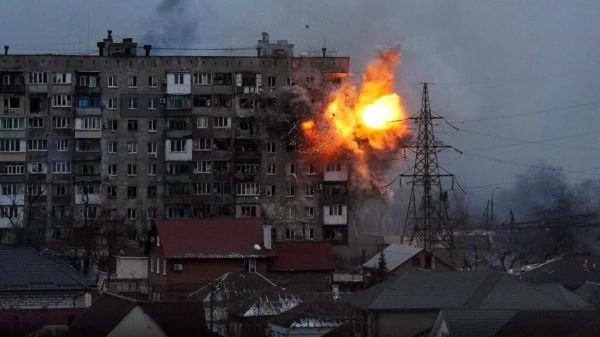
German intelligence services suspect that Russia is using so-called "disposable agents" - recruited civilians who engage in sabotage, espionage, or propaganda for small amounts of money.
Moscow is increasingly attacking Germany in the hybrid space: through espionage, disinformation, and allegedly drone flights. According to Federal Chancellor Friedrich Merz (CDU), Germany may not be at war, but it is not entirely at peace either.
The last few weeks have been marred by drone flights over military, critical, and civilian infrastructure, such as Munich Airport. The Chancellor and Defense Minister Boris Pistorius (SPD) have accused Russia of being involved in some of these flights.
At the same time, it remains unclear who exactly operated the drones. To determine this, it is necessary to catch the operators of the unmanned flying objects. So far, apparently, none of the drones have been detected. But it is clear that there are two types of flights: professional flights using large drones and amateur flights using commercially available small models.
In the case of the latter, there is suspicion that some flights could have been carried out by so-called "disposable agents," also known as "low-level agents."
Disposable Agents: Quick Deployment, High Risk
Recently, the Federal Office for the Protection of the Constitution, the Federal Intelligence Service (BND), the Federal Criminal Police Office (BKA), and the Military Counterintelligence Service (MAD) issued a warning advising people not to allow themselves to be hired as "disposable agents" by foreign entities.
These are individuals who are typically hired through social media to carry out "minor" and "easy" tasks, such as vandalism, espionage, or arson, for relatively small amounts of money.
"Disposable agents are usually used for tangible actions," explains Dr. Christopher Nering, an expert on disinformation and director of intelligence at the Cyber Intelligence Institute, in an interview with Euronews.
He acknowledges that while these agents engage in intelligence activities, they cannot be called spies, as espionage implies covert information gathering. "That’s not quite what they are used for," Nering says, adding that instead of gathering information, they set items on fire, stick propaganda stickers on walls, spray graffiti on surfaces, or damage property.
Is Ideology Enough to Become a Low-Level Agent?
Terrorism expert and head of the "Countering Extremism" project Dr. Hans Jakob Schindler explains in an interview with Euronews that these "agents" are hired for one reason only: so that they do not know about the structures of Russian intelligence services in Germany and Europe. They operate not only in Germany but throughout Europe.
Therefore, for foreign players, including Russia, they possess the advantage of anonymity. They are usually found through pro-Russian Telegram channels, where they attract attention with pro-Russian statements. Then, agents, who according to Schindler are typically men with low levels of education, are contacted and hired.
"It’s really just about finding someone who is either ideologically motivated to help or has a financial interest - ideally both," Schindler says. At the same time, according to Schindler, it is unlikely that anyone takes on the job solely for ideological reasons, as money always plays a role. "Difficult economic circumstances plus ideological closeness is practically the ideal set-up," adds the terrorism expert.
The issue of disposable agents is relatively straightforward, Schindler believes. It involves conducting as many minor operations as possible that can work on a larger scale but are inexpensive and, naturally, minimize risk for the Russian side, he explains.
Nering agrees with him, confirming that the actions of agents are usually "not very complex." When it comes to sabotage operations, they are often small-scale, relatively causing little damage, the number of which creates a sense of insecurity. "Hybrid warfare is not aimed at dismantling Germany or NATO, but at politically weakening the will to defend by creating a huge sense of insecurity," Nering says.
Many of their actions may seem harmless at first glance, but they are seen as precursors to further escalation.
What Do These Acts of Sabotage Look Like?
During the election campaign earlier this year, more than 270 cars in several federal states were covered with construction foam and adorned with stickers featuring the face of Green Party chancellor candidate Robert Habeck and the slogan "Be Greener."
Initially, climate activists were suspected, but according to an investigation by Spiegel, it is believed that this was a Russian diversion - aimed at inciting sentiments against the "Greens" and their chancellor candidate.
Military support for Ukraine is also in the spotlight. It was recently revealed that Russian drones were spying on arms supplies to Ukraine. Disposable agents are also used for such actions, including Dieter S. and Alexander Y., who had to answer for this in the Higher Regional Court of Munich.
The accusation against Dieter S. is that he promised a contact to carry out explosions and arsons at military infrastructure and industrial sites in Germany. According to the investigation, Alexander Y. assisted him.
He reportedly scouted potential targets and sent his contact images and videos, such as military transport. According to the indictment, the plans were aimed at preventing Germany from supporting Ukraine. One of the possible targets mentioned was the railway line used for transporting weapons.
Anonymity on the internet allows foreign actors to cover their tracks in such actions and make themselves "untraceable." If a hired agent is caught during his sabotage or espionage mission, as in the case of Dieter S., only he bears responsibility for the crime.
How Do Employers View "Disposable Agents"?
According to intelligence services, Russia is increasingly resorting to inexperienced accomplices. The reason is simple: with the onset of the aggressive war against Ukraine, it has become increasingly difficult for Russian intelligence services to infiltrate their own agents in Germany.
While the exact number is unknown, various reports suggest that since the beginning of the large-scale invasion of Ukraine, at least 60 Russian diplomats have been expelled from Germany. Not every Russian diplomat automatically becomes a spy, but many Western intelligence services suspect that some diplomats are involved in espionage. They enjoy immunity and are officially accredited to carry out political, economic, or cultural tasks.
Due to this limitation, the use of "low-level agents" in intelligence circles is also referred to as an "act of desperation."
"Disposable agents are discarded in this sense," Schindler explains, adding that the Russian side does not care about the fate of short-term agents. "They are only interested in creating security threats and gathering information."
Crimes are punishable from "anti-constitutional sabotage" with prison sentences of up to five years to "agent activity of a secret service" in particularly serious cases with prison sentences of up to ten years.
So far, investigators have usually managed to catch only suspected "disposable agents," but not those who ordered acts of sabotage. According to an investigation conducted by ZDF frontal, this is a constant dilemma for the German Office for the Protection of the Constitution: even after thorough investigations, the guilt of the suspects is often not conclusively established.














Leave a comment